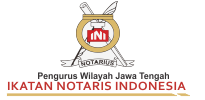The Role of Notary in Land Liberation Relation to PLTU Development for Public Interest
Abstract
PLTU Batang is a steam power plant built in Batang Regency which is expected to meet the national electricity needs in the Java and Bali regions. The PLTU is located in three villages namely Ujungnegoro, Karanggeneng, and Ponowareng, near the Ujungnegoro Sea. Among the three villages, Karanggeneng had the biggest impact because the majority of its residents experienced the impact of the PLTU construction. The purpose of this study was to evaluate the influence of the PLTU development policy on the social life of the Karanggeneng Village community. This research uses the method juridical sociology, namely in this study the author conducts a review of the legal aspects to find out the applicable regulations, especially those relating to the role of notaries in land acquisition in. The data collection techniques used were interviews, observation, and documentation. The results showed that the existence of PLTU Batang affected the Karanggeneng Village community who were forced to sell their land, the future of the local community was also affected because of the change in land functions resulting in the community losing their livelihoods. The PLTU policy has an impact on current and future conditions, namely increasing unemployment and poverty in Karanggeneng Village, but the form of PT PBI's responsibility is the establishment of a KUB for affected communities, it is suggested that the construction of PLTU Batang should pay more attention to the socio-economic conditions of the community. This study aims to determine the process of land or land acquisition for PLTU development in Batang Regency, where there is a notary's role in making authentic deeds. The Land Acquisition Committee (P2T), refers to the land acquisition regulations at that time. This type of research is sociological juridical. The Land Acquisition Committee changes the designation of the Regional Spatial Planning (RTRW), also provides compensation in the form of money in the release of land that does not have ownership rights based on the Basic Agrarian Law (UUPA) and Government Regulation Number 24 of 1997. Notaries make the Deed of Releasing Rights to Land and the Deed of Debt Recognition in the said land acquisition, while the land acquisition is on state land, so there is no relinquishment of land rights in the legal act.
Keywords
Full Text:
PDFReferences
Books:
Hartati Sulihandari. (2013). Prinsip-prinsip Dasar Profesi Notaris. Jakarta: Dunia Cerdas.
Muntaqo Firman. (2010). Karaktar Kebijakan Hukum Pertanahan Era Orde Baru dan Era Reformasi. Semarang: Badan Penerbit Undip, Cetakan 1.
R.M. Suryodiningrat. (1991). Perikatan-Perikatan Bersumber Perjanjian. Bandung: Tarsito.
Tan Thong Kie. (2007). Studi Notariat dan Serba-Serbi Praktek Notaris. Jakarta: PT. Ichtiar Baru Van Hoeve.
Urip Santoso. (2006). Hukum Agraria Dan Hak - Hak Atas Tanah, cet. 2. Jakarta: Kencana.
Internet:
http://lib.ui.ac.id/file?file=digital/130992-T%2027422-Pengawasan%20majelis-Pendahuluan.pdf accessed on March 13, 2020, 02.31
Regulation:
Constitution
Code of Civil law
Act No 30 of 2004 concerning Notary Position.
Presidential Regulation Number 102 of 2016 concerning Land Acquisition for Implementation of Development in the Public Interest in the Context of Implementing National Strategic Projects.
Presidential Regulation No. 71 of 2012 concerning Implementation of Land Acquisition for Development for Public Interest
DOI: http://dx.doi.org/10.30659/akta.v8i1.14985
Refbacks
- There are currently no refbacks.
Copyright (c) 2021 Jurnal Akta

This work is licensed under a Creative Commons Attribution-NonCommercial-NoDerivatives 4.0 International License.
Jurnal Akta has been indexed by:
Editorial Office: Jurnal Akta Room 2nd Floor Imam As Syafei Building Faculty of Law Universitas Islam Sultan Agung. Jln. Kaligawe KM. 4, Semarang City, Central Java, Indonesia. Phone +62 24 6583584 Fax +62 24 6582455
Email: jurnalakta@unissula.ac.id

![download[4]](https://jurnal.stiki-indonesia.ac.id/public/site/images/adminjurnal/template_jurnal_tosca1.png)














